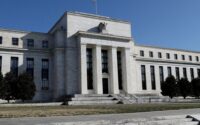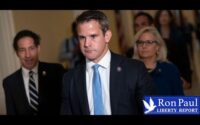Our Economy Needs a Good Dose of Customer-Driven Deflation
The following policies would result is a more peaceful and equitable society:
— Federal legislators are limited to one term each, with much reduced pay. Senatorial terms are cut from 6 years to 4. These changes would make Congress less responsive to constituent demands, inducing people to meet more of their needs in the private sector. After the government incurs a deficit, the remuneration of legislators and administrators is reduced during the year that follows. Judges are limited to ten-year terms.
— The government is isolationist. The U.S. State Department and its embassies are abolished. The U.S. leaves the United Nations and requires the United Nations to leave the United States. The U.S. defends the nation from military and electronic incursions only from Mexico, Canada, the sea, the air, and from space. Its navy stops patrolling the world’s oceans.
— Private-sector Americans, including those engaged in trade, tourism, and private foreign aid, may be as interventionist as they please. Military weapons owned by private parties may be stored in America for use by them elsewhere. The U.S. government does not ensure the safety of its citizens abroad.
— The Federal Reserve Bank is abolished. Attempts by anyone, never mind a government agency, to regulate the economy cannot help but make things worse. The Fed has greatly increased economic volatility, making life especially hard on the poor during downturns. Keeping interest rates low increases the value of assets. Since most assets are owned by the prosperous, wealth has become ever more unequal. The government’s monopoly over the dollar is removed. Anything may serve as a currency. Currencies are freely exchangeable, allowing the people to choose which ones are most convenient and best hold their value.
— The Civil Service System is abolished. The former spoils system did little damage and created far less incentive to expand government.
— The premiums for health insurance are low, since policyholders pay all of their medical costs up to the year’s substantial deductible. Policyholders thereby become familiar with healthcare costs, and competition between suppliers drives the costs way down. After a person’s deductible is spent, the insurance company covers all health costs. Younger people leave most of their deductibles unspent.
— Government has nothing to do with education. Many government schools are poor, especially in low-income areas, and universities are replete with idiotic notions. All schools are owned privately, for profit or non-profit. With taxes lowered, the prosperous would likely compete as to who can provide the most help to central-city schools.
— Government stops gathering statistics, because the statistics induce the government to try to solve problems, and most such solutions make things worse. Statistics are collected and paid for by the private sector.
— Bank deposit insurance is terminated. The guarantees have caused depositors to care about the rate of interest and the convenience, but not the money’s safety – a partial cause of the nation’s enormous expansion of debt.
— Government zoning impedes free markets and is abolished.
— Federal laws that support unions are repealed. The interaction between employees and employers is none of the government’s business. Workers can unionize, but without government backing.
— Government’s flood insurance with excessively low premiums is terminated. When floods occur, the costs are spread among all the people or added to the debt. The benefits to the few seacoast dwellers are substantial and obvious. The per-capita costs to the many Americans are small and hidden.
— The Jones Act restricts American shipping and imposes significant costs on Americans. It is abolished.
— The government stops paying farmers for staple commodities, especially corn. The subsidies have lowered consumer costs of staple commodities and contributed to widespread obesity.
— Drug testing is not performed by the government. Bureaucrats avoid blame by keeping effective drugs off the market longer than necessary. More lives are lost from the delays than are saved by ensuring the drugs are safe.
— Government funding of scientific developments has politicized science and is terminated. Scientific development is funded exclusively by the private sector, partly in concert with the military.
— All tariffs and impediments to trade are repealed. Nations that do not impede international trade are more prosperous and more equitable.
— Gun controls prevent good people from owning guns. Bad people obtain them anyway. Gun controls therefore make things worse and are abolished.
— Government does nothing about viruses. Corrective measures, if any, are taken within the private sector.
— The forfeiture of privately-owned assets to benefit police departments is terminated.
Dynamics of Government
Like everyone else, government bureaucrats act in their own best interests. Having no profits, they measure their self-worth by expanding their budgets, avoiding blame, and increasing their power over others. They generally avoid actually solving problems, because doing so would render their jobs unnecessary. Government’s principal objective is to expand its reach and power. With few exceptions, government is the worst and most expensive way to do anything.
With big government, the rich gain wealth faster than the poor, because legislators reward the rich for their campaign gifts. With small government, the poor gain wealth faster than the rich, probably because they’re willing to work harder.
Media stories about government are newsworthy. But unless wrongdoing or sex is involved, stories about individuals going about their private affairs are not newsworthy, since they usually affect only the individual involved. The media’s natural inclination to favor government is a danger to society and is partly corrected by education.
Police Funding
Providing the following provisions are first enacted, the funding of police departments is much reduced:
— Members of the public may carry weapons, hidden or not, without licenses. The public would largely police itself, as occurred successfully in the 19th Century. Trying to prevent unbalanced people from owning guns is the job of the private sector, not government.
— The disastrous war against drugs is terminated. Drugs are treated as medical problems, not crimes, and information about drugs is taught in schools.
— Prostitution is legalized. What people choose to do with their bodies is none of the government’s business.
— Since unions try to prevent bad cops from being fired, police departments may not unionize.
— Businesses that fail to obtain suitable property and casualty insurance cannot obtain financing. Insurance companies coordinate with banks and finance companies to determine the proper conditions.
— Cameras at intersections are operated by a consortium of insurers. If a car has not stopped appropriately, the owner is automatically sent a ticket and notified that his auto insurance premiums have been raised.
The Federal Debt
The default of at least a portion of the federal debt is closer than people realize. If the cost of carrying the debt rises even to the current rate of inflation, it would crowd out current expenses and force at least a partial government default.
The federal government owns 28% of the nation’s land and almost $5 billion of gold. It should transfer these assets to private parties in return for their accepting portions of the nation’s debts. Rivers, inland waterways, lakes, swamps, aquifers, mountains, forests, prairies, deserts, tundra, roads, highways, bridges, dams, reservoirs, the national parks, and the 12-mile band of ocean that rings the nation could all be exchanged for debt relief. Amtrak, urban transportation, airports, and the postal service should all be privatized.
The owners of the Mississippi and Missouri Rivers, for example, could earn money from those who use the waters for irrigation, transportation, manufacturing, fishing, drinking, and recreation. After Congress decides the extent of liability by the owners for floods, the values of these rivers would be sky-high.
Policies that Especially Hurt the Poor
The following government policies make life more difficult and more expensive for the poor and are terminated:
— Government lotteries are advertised heavily in poor areas, encouraging people to treat them as investments, not entertainment. The lotteries create gambling addictions and breed poverty.
— Used automobiles are bargains. The prosperous pay heavily to buy new cars. The non-prosperous underpay to buy them subsequently. This substantial, non-governmental, income-transfer program operates now because government interferes relatively little with automobile marketing. But land-use, building, banking, environmental, farming, mining, water, tax, and who knows what other laws interfere with real estate sales, preventing a much larger income-transfer program from operating with housing.
— Occupational licenses require fees and long periods of training, restricting the number of people in the professions. The resulting shortage of workers elevates the prices of their products. The poor can’t afford the fees and expensive training to join the professions, but they pay the higher prices when they buy the products.
— Rent control enables older, relatively prosperous tenants whose lives are stable to enjoy low rents. But after they vacate the apartments, the rents are raised. The higher rents are paid by younger, less prosperous people who move frequently.
— Many small businesses are exempt from paying minimum wages. After government requires larger companies to raise minimum wages, the number of employees who begin being paid below the minimum greatly outnumber those who enjoy the higher minimum wages.
— Regulations often raise child-care costs beyond the reach of lower-income parents, preventing them from obtaining jobs.
— The Social Security system transfers money from workers to retirees and holds no investment reserves. With the number of retirees growing faster than the number of workers, the system is certain to fail.
— The life expectancy of black men is shorter than that of white women. Since Social Security benefits terminate when a person dies, the FICA taxes paid by black men support white women, but not the other way around.
— Anti-gouging laws force down the prices of products during emergencies, reducing the supply of the products, especially in poor areas.
— Taxing the rich at high tax rates hurts the poor, because the rich have less money available to create jobs.
Without government holding them down, the poor would pull themselves out of poverty. Any social safety net that’s necessary would be supplied by the private sector.
Government’s Proper Duties
The long-term results of the following government duties are beneficial:
— The federal government defends the nation and sets and enforces immigration policies.
— The states set and enforce election laws.
— Local and state governments enact basic laws, keeping people from hurting others by force or fraud. They are backed by the police, the armed citizenry, and the courts. The owners of roads and other infrastructures furnish their own police forces.
— The enforcement of contracts and adjudication of lawsuits are discharged by the courts to the extent those issues are not resolved by mediators.
Summary
Most laws and government regulations cause long-term harm. The government sector therefore constitutes less than 5% of the GDP.
Since the government sector has grown during most of the years since 1900, the long term has come home to roost, making the nation more and more dysfunctional. Government’s increasing use of force induces increasing violence among the people.
The private sector creates a solution whenever there’s a purchase and sale – literally billions of times a day. On all such occasions, the buyers and the sellers feel that they benefit.
Transactions expected to be beneficial may of course turn out to be mistakes. Some people make more mistakes than others. The only solution is the individual’s effort and learning.
Since government resists change, the only solution for its mistakes is to make government much, much smaller.
[ad_2]
Source link


